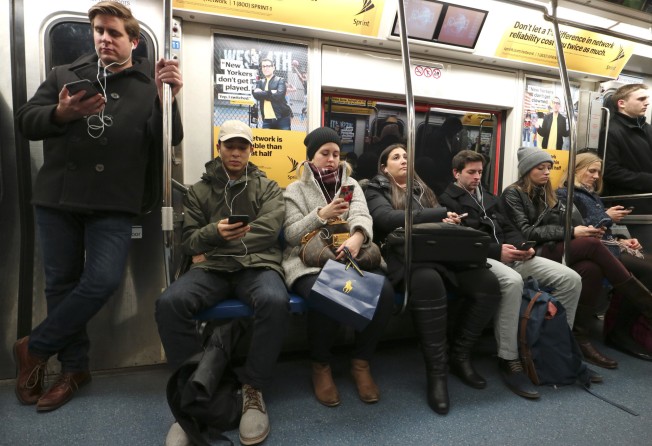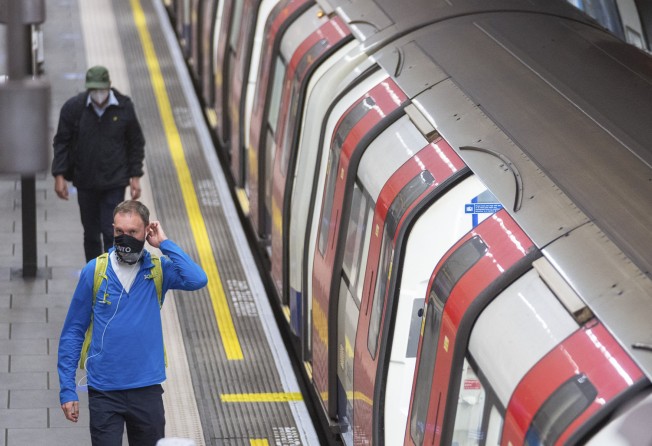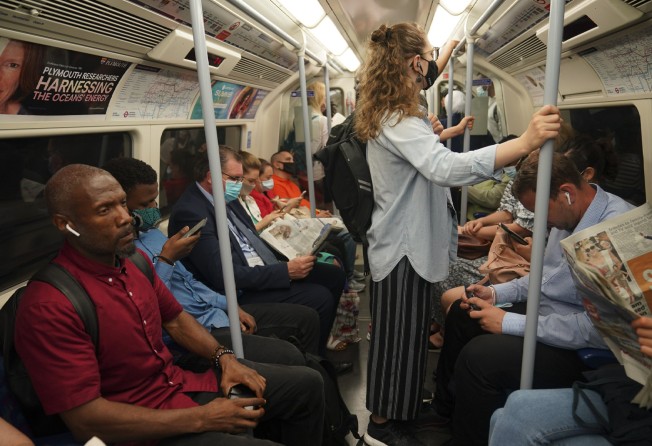
Headphone wearing makes the loneliness epidemic worse, expert warns, after study finds more than a third of UK users wear them to avoid having to talk to others
- A study for headset maker Jabra finds nearly half of UK headphone users wear them for walks and the average Briton goes five weeks without talking to strangers
- It has called on people to step away from their headphones for a day because ‘social interaction and the company of friends means everything’

People can go more than a month without having a meaningful conversation with someone new because of how long they spend wearing headphones, research suggests.
A study by audio firm Jabra found that British headphone users wear them for on average 58 minutes a day, with 38 per cent keeping them on to actively avoid talking to others.
The research found that nearly half of those asked (47 per cent) wear headphones when they go for a walk, 29 per cent said they did so when travelling on public transport and 15 per cent said they wear headphones every day for non-work purposes, a figure that rises to 30 per cent among 16- to 24-year-olds.
It said people in Britain were now going, on average, five weeks without talking to someone new.

In response, Jabra has called on people to step away from their headphones for one day to reconnect with others around them.
The study has sparked concerns over loneliness and a lack of social interaction, particularly in the wake of lockdown restrictions during the coronavirus pandemic.
Jabra’s research found that 32 per cent of those asked said they were speaking to new people less often than they did before the first lockdown in Britain in March 2020, while 20 per cent said they felt significantly less connected to others.
Professor Noreena Hertz, author of The Lonely Century, said the study showed that “we are in the midst of a crisis of disconnection that the pandemic has significantly amplified”.
“But even before the pandemic struck, this was the lonely century – ensconced in our digital privacy bubbles, headphones on, heads in our phones, all too often we actively distanced ourselves from those around us,” she said.

“With loneliness damaging not only our mental but also our physical health – loneliness is as bad for our health as smoking 15 cigarettes a day – it’s essential that we commit to reconnect in person. This isn’t an onerous ask. Researchers have found that even just a 30-second exchange with a stranger can make us feel significantly less lonely and significantly more connected to those around us.”
Steve Evans, Jabra managing director of consumer solutions in Europe, said the firm was now encouraging people to put down their headphones for one day to connect more with those around them.
“For many of us, wearing headphones is part of everyday life, whether for work calls or entertainment, such as listening to music when we’re on the move,” he said. “But from time to time, it’s good to have a break and channel our focus on the real outside world. One of the things the last 18 months has taught us is that social interaction and the company of friends means everything.”

“So, we are asking everyone to join us in going truly headphone-free for one day, to take time to connect with friends and enjoy the sights and sounds around them,” said Evans. “Your headphones will be right where you left them when you choose to come back.”
Meanwhile, Jabra also examined what “sounds” people around the world missed the most during the Covid-19 pandemic lockdown. They include “live music at [classical] concert” (on average 65 per cent), “splashing and laughter around a swimming pool” (60 per cent), “cutlery and dinner noises at a restaurant” (58 per cent), “theatre applause” (56 per cent) and “bar/pub noises” (53 per cent).
While the sound of live music is most acutely missed in Europe (77 per cent in Italy), thanks to the continent’s musical heritage, Americans (74 per cent) have the sound of splashing and laughter around a swimming pool at the top of the list.
As to what sounds people did not miss, the Jabra study points to the noises associated with the gym. Only 31 per cent of participants said they missed that, suggesting that the pandemic has provided a welcome break from the grunting associated with working out.